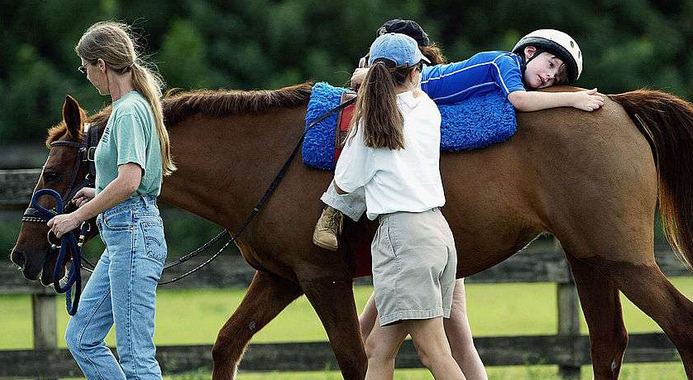|
Getting your Trinity Audio player ready...
|
In a world filled with constant stressors and challenges, finding effective ways to manage our mental and emotional well-being is crucial. In this article, we are going to give you the importance of horses in therapy.

The Role of Horses in Therapy
The Foundations of Equine Therapy
At its core, Equine Therapy involves interactions between individuals and horses under the guidance of trained therapists or facilitators. These therapeutic sessions often take place in natural settings, such as farms or equestrian centres, creating a serene and non-judgmental environment for clients. The therapy sessions incorporate various activities that require participants to engage with the horses physically, emotionally, and psychologically.
Connecting with These Majestic Beings
One of the primary objectives of Equine Therapy is to establish a profound connection between clients and horses. Horses are highly sensitive animals with the ability to mirror human emotions and intentions. As clients interact with the horses, they learn to recognize and interpret the horses’ responses, leading to a better understanding of their own emotional states and behaviours.
Therapeutic Riding: A Path to Physical and Emotional Healing
Equine-assisted therapy can take various forms, with Therapeutic Riding being one of the most common. This approach is particularly beneficial for individuals with physical disabilities, as it helps improve balance, coordination, muscle strength, and mobility. Beyond the physical benefits, Therapeutic Riding fosters a sense of accomplishment and empowerment, boosting self-esteem and emotional well-being.
Emotional Regulation and Empathy
Horses have an uncanny ability to sense and respond to human emotions, making them ideal partners in therapy for individuals struggling with emotional regulation. As clients engage in activities like grooming or leading the horses, they learn to manage their emotional responses. By observing how the horses react to their actions and emotions, clients develop greater self-awareness and empathy, which are essential skills for healthy relationships and personal growth.
Equine Therapy for Children and Adolescents
Equine-assisted therapy is especially effective for children and adolescents who may have difficulty expressing their emotions verbally. Interacting with horses provides a non-verbal avenue for communication and emotional expression. Through these interactions, young clients can develop essential social and emotional skills, such as trust, empathy, and self-confidence.
Overcoming Trauma and Building Trust
For individuals who have experienced trauma, be it physical, emotional, or psychological, Equine Therapy can be a transformative healing modality. Horses’ innate sensitivity and non-judgmental nature create a safe space for trauma survivors to confront their fears and work through their emotions. Building trust with a horse can be a powerful metaphor for rebuilding trust in oneself and in others.
Improving Communication Skills
Effective communication is a cornerstone of healthy relationships and personal growth. Equine Therapy challenges clients to communicate with horses using body language, tone, and energy. This non-verbal communication fosters improved interpersonal skills and empowers clients to convey their thoughts and feelings more effectively in their everyday lives.
Equine Therapy for Veterans and PTSD
Veterans who have experienced the traumas of war often struggle with post-traumatic stress disorder (PTSD) and other mental health issues. Equine Therapy has shown remarkable success in helping veterans cope with these challenges. The connection formed between veterans and treatment horses offers a sense of camaraderie and support that can be difficult to find elsewhere.
Anxiety and Depression Management
Anxiety and depression are pervasive mental health issues that can significantly impact a person’s quality of life. Equine-assisted therapy provides a unique avenue for managing these conditions. The calming presence of horses, combined with the outdoor setting, can help reduce anxiety and depression symptoms. Additionally, the sense of accomplishment and connection developed during therapy sessions can improve clients’ overall emotional well-being.
The Role of Equine Therapy in Addiction Recovery
Substance abuse and addiction often stem from underlying emotional and psychological issues. Equine Therapy can play a vital role in addiction recovery by addressing these root causes. Clients in recovery can benefit from the emotional support and self-awareness that come from working with horses, aiding them in their journey toward sobriety.
Conclusion: The Transformative Power of Equine Therapy
Equine-assisted therapy is a testament to the remarkable bond between humans and horses and the therapeutic potential it holds. By harnessing the innate qualities of horses, such as sensitivity, non-judgment, and intuition, individuals can embark on a transformative journey toward healing, personal growth, and improved emotional well-being. Whether it’s enhancing physical abilities, managing emotions, or healing from trauma, Equine Therapy offers a holistic approach to treatment that transcends traditional methods. As more people recognize the profound impact horses can have on their lives, the field of Equine-Assisted Therapy continues to grow, offering hope and healing to individuals of all ages and backgrounds.
